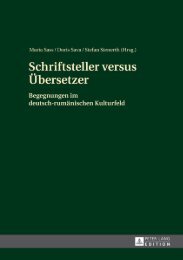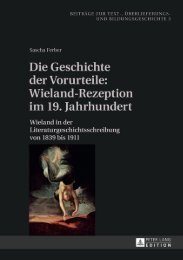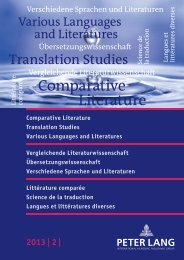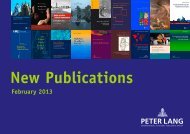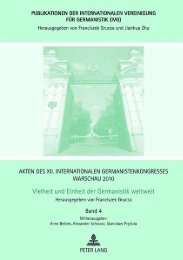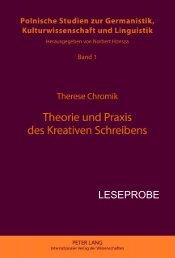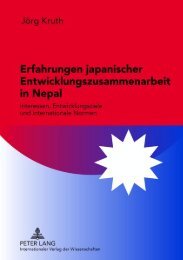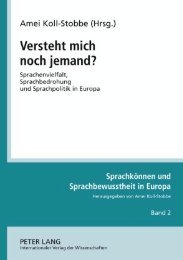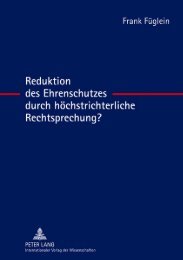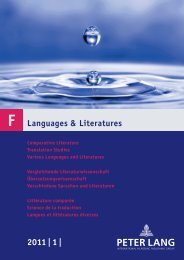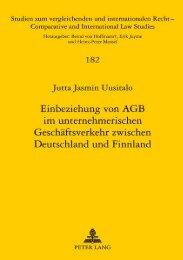Sie wollen auch ein ePaper? Erhöhen Sie die Reichweite Ihrer Titel.
YUMPU macht aus Druck-PDFs automatisch weboptimierte ePaper, die Google liebt.
I<br />
s the Asian stem family different from its<br />
European counterpart? This question is a<br />
central issue in this collection of essays assembled<br />
by two historians of the family in Eurasian<br />
perspective . The stem family is characterized<br />
by the residential rule that only one<br />
married child remains with the parents . This<br />
rule has a direct effect upon household structure<br />
. In short, the stem family is a domestic<br />
unit of production and reproduction that persists<br />
over generations, handing down the patrimony<br />
through non-egalitarian inheritance .<br />
In spite of its ambiguous status in current family<br />
typology as something lurking in the valley<br />
between the nuclear family and the joint<br />
family, the stem family was an important family<br />
form in pre-industrial Western Europe and<br />
has been a focus of the European family history<br />
since Frédéric Le Play and more recently<br />
<strong>Peter</strong> Laslett . However, the encounter with<br />
Asian family history has revealed that many<br />
areas in Asia also had and still have a considerable<br />
proportion of households with a stemfamily<br />
structure . The stem family debate has<br />
entered a new stage . In this book, some studies<br />
that benefited from recently created large<br />
databases present micro-level analyses of dynamic<br />
aspects of family systems, while others<br />
discuss more broadly the rise and fall of family<br />
systems, past and present . A main concern<br />
of this book is whether the family type in a society<br />
is ethno-culturally determined and resistant<br />
to changes or created by socio-economic<br />
conditions . Such a comparison that includes<br />
Asian countries activates a new phase<br />
of the discussion on the stem family and family<br />
systems in a global perspective .<br />
Contents: Antoinette Fauve-Chamoux/<br />
Emiko Ochiai: Introduction • Richard Wall: Ideology<br />
and Reality of the Stem Family in the Writings<br />
of Frédéric Le Play • Jürgen Schlumbohm:<br />
Strong Myths and Flexible Practices: House and<br />
Stem Family in Germany • Josef Ehmer: House<br />
and the Stem Family in Austria • Jim Brown: The<br />
Stem Family in Lower Austria, 1788-1848: Demographic<br />
and Economic Constraints • Sølvi Sogner:<br />
The Norwegian Stem Family: Myth or Reality?<br />
• Beatrice Moring: Land, Inheritance and the<br />
Antoinette Fauve-Chamoux • Emiko Ochiai (eds)<br />
The Stem Family in Eurasian Perspective<br />
Revisiting House Societies, 17th-20th centuries<br />
Bern, Berlin, Bruxelles, Frankfurt am Main, New York, Oxford, Wien, 2009 .<br />
XIV, 558 pp ., 10 ill ., num . tables and graphs<br />
Population, Family, and Society . Vol . 10<br />
Edited by Michel Oris<br />
pb . ISBN 978-3-03911-739-0<br />
CHF 113 .– / € D 86 .30 / € A 88 .80 / € 80 .70 / £ 73 .– / US-$ 121 .95<br />
Finnish Stem Family • Antoinette Fauve-<br />
Chamoux: The Stem Family and the Picardy-<br />
Wallonia Model • Karl Kaser: The Stem Family<br />
in Eastern Europe: Cross-Cultural and Trans-<br />
Temporal Perspectives • Chiyo Yonemura/<br />
Mary Louise Nagata: Continuity, Solidarity,<br />
Family and Enterprise: What is an Ie? • Emiko<br />
Ochiai: Two Types of Stem Household System<br />
in Japan: the Ie in Global Perspective • Satomi<br />
Kurosu: Marriage, Divorce and Remarriage in<br />
a Stem-Family System: Women in Two Northeastern<br />
Japanese Villages, 1716-1870 • Hideki<br />
Nakazato: Transitions in Living Arrangements<br />
over the Life Course: Aging in a Rural Village<br />
in Japan, 1716-1869 • Mary Louise Nagata: Name<br />
Changing Patterns and the Stem Family in<br />
Early Modern Japan: Shimomoriya • Hanhee<br />
Hahm: Stem Family in Korea: Old and New •<br />
Paik Sungjong: Strategies of Survival: Variability<br />
of Family Structure in Tŏksu Village on<br />
Cheju Island, Korea from 1804 to 1809 • Khuat<br />
Thu Hong: Stem Family in Vietnam • Bhassorn<br />
Limanonda: An Empirical Analysis on the Stem<br />
Family: a Case Study of Thailand • Michel<br />
Cartier: Three Generation Families in Contemporary<br />
China: the Emergence of the Stem Family?<br />
• Antoinette Fauve-Chamoux: Family Reproduction<br />
and Stem-Family System: from Pyrenean<br />
Valleys to Norwegian Farms • Antoinette Fauve-<br />
Chamoux: A Comparative Study of Family<br />
Transmission Systems in the Central Pyrenees<br />
and Northeastern Japan .<br />
«The book is a reference point in historical research<br />
on family patterns, for its wide and multifaceted<br />
range of empirical studies.» (Giuseppe<br />
A. Micheli, European Journal of Population)<br />
antoinette Fauve-Chamoux is Maître<br />
de Conférences at Ecole des Hautes Etudes en<br />
Sciences Sociales (EHESS), Centre de Recherches<br />
Historiques/CNRS, Paris (France), where<br />
she teaches History of the Family . She was a<br />
researcher at the Polish Academy of Sciences,<br />
Warsaw, associate Professor at University of<br />
Montréal, Canada, and is currently honorary<br />
Professor at National University of Salta, Argentina<br />
. As a social historian and historical<br />
Histoire · Geschichte · History<br />
demographer, she has edited several books<br />
and published numerous essays on the history<br />
of the family, Malthusianism, female migration,<br />
gender studies and social change in<br />
Europe, and comparative family transmission<br />
systems in Eurasia .<br />
emiko oChiai is Professor of Sociology at<br />
the Graduate School of Letters, Kyoto University<br />
. She was an Associate Professor at the International<br />
Research Center for Japanese Studies<br />
in Kyoto and was a visiting research fellow at<br />
the Cambridge Group for the History of Population<br />
and Social Structure . Her major research<br />
field is the historical and comparative sociology<br />
of the family and gender . Her book The<br />
Japanese Family System in Transition. A Sociological<br />
Analysis of Family Change in Postwar Japan<br />
was published in Japanese in 1994 and<br />
translated into Korean, Chinese and English .<br />
Olivier de Lapparent<br />
Raymond Aron et l’Europe<br />
Itinéraire d’un Européen dans le siècle<br />
Bern, Berlin, Bruxelles, Frankfurt am Main,<br />
New York, Oxford, Wien, 2010 . XVI, 167 p .<br />
Convergences . Vol . 58<br />
Directeur de collection : Michel Grunewald<br />
br . ISBN 978-3-0343-0416-0<br />
L<br />
CHF 55 .– / € D 42 .10 / € A 43 .20 / € 39 .30 /<br />
£ 35 .– / US-$ 58 .95<br />
eBook 978-3-0352-0026-3<br />
engagement européen de Raymond Aron<br />
’ est méconnu . Au mieux, on entrevoit<br />
qu’il rejette dos à dos Monnet et De Gaulle,<br />
preuve de son euroscepticisme supposé . Au<br />
pire, on le considère comme le chantre d’un<br />
atlantisme forcené où l’Europe est assujettie<br />
aux Etats-Unis . La question ne se règle pas<br />
aussi facilement . Il s’agit d’étudier l’itinéraire<br />
européen d’Aron tout au long de ses actions<br />
de militant et de ses écrits, dès ses premiers<br />
articles au début des années trente jusqu’à<br />
ses derniers éditoriaux en octobre 1983 . Comment<br />
a-t-il pensé l’Europe à travers ses livres,<br />
articles, cours et conférences ? Quel Européen<br />
se bat pour quelle forme d’Europe ?<br />
Croit-il en une identité européenne spécifique<br />
?<br />
En abordant des thèmes récurrents dans<br />
les travaux d’Aron, comme le devoir de responsabilité<br />
de l’intellectuel, la question du<br />
déterminisme historique, la dénonciation de<br />
l’idéologie et de ses dangers, la lutte contre<br />
le totalitarisme, l’analyse des relations internationales<br />
et la problématique de l’hypothétique<br />
crise ou décadence de la civilisation occidentale,<br />
ce livre a pour ambition d’éclairer<br />
Our complete backlist is available at www.peterlang.com<br />
27



